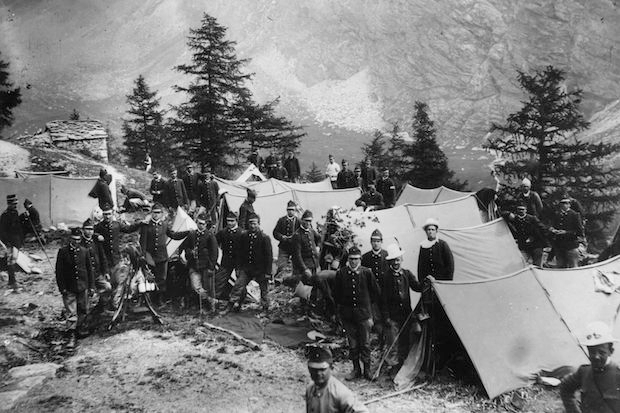From ‘The Future of Italy‘, The Spectator, 22 May 1915:
WHEN the King of Italy found himself unable to accept the resignation of Signor Salandra at the end of last week the intervention of Italy on the side of the Allies became almost certain. The cause of the neutralist party had flared up for a moment, but had succeeded only in illuminating the strong reserves of the interventionists which were waiting in the background. The dramatic attempt of Signor Giolitti to keep Italy neutral—and, if possible, in an attitude of benevolence towards Germany—was but the affair of a few hours. Public opinion would have nothing to do with it. As we write we do not know when war will be declared, but we can say with confidence that the course of Italy is irrevocably marked out. Her future lies where her sympathy lies, with the Powers of the Triple Entente. She knows that much more than the possession of this or that piece of territory is at stake. Honour, sentiment, affection, are greater and more abiding things than territory. The country which has to its credit one of the most glorious fights for freedom in the history of man cannot consent to the strangling of Belgium, to the tearing up of treaties which are the charter of freedom of small peoples, to being bound to the chariot wheels of a prancing military despotism. We shall not even try to describe the gladness and pride with which we have learned that the country of Garibaldi has come to this decision. Them has been no attempt here to force Italy to intervene. She is doing it of her own judgment because events have proved to her that she cannot do her duty to the world and to herself in any other way. She knows that the course she has chosen means sacrifices, mourning, privations ; but though the Italians have had their fill of war lately they have shouted in their streets for war.
Those who undervalue the Italian Army make a great mistake. It should be remembered that the difference in quality between the German and Austrian Armies and the Italian Army is not the same now as it was at the begin- ning of the war. Italy cannot be met now by first-line troops. And even if it were not so, the menace on the Austrian flank would not be a thing to be disregarded by the German and Austrian General Staffs. If Italy has, say, a million men at her disposal she will be able to put half a million into the fighting line, and at the very least these will neutralize an equal number of Austrians. The strategic possibilities of the inter- vention of Italy, attractive though they are, must not be discussed. But the broad fact is more than ever plain that Germany and Austria are now besieged countries. The circle round them, except for the email stripe of the Netherlands and Denmark (and even these are almost sea frontiers), will be complete. The political possibilities are as considerable as the strategic. Every Balkan State has been waiting for the word of Italy ; and the word of Italy is once more for freedom—for the banner that “streams like the thunderstorm against the wind.”






Comments